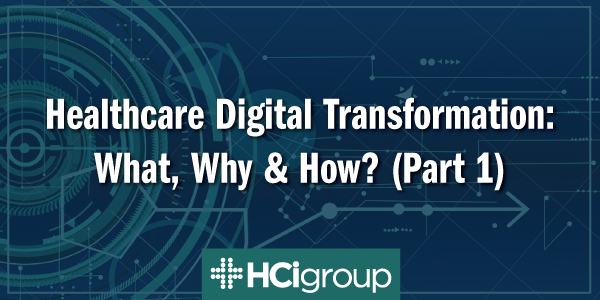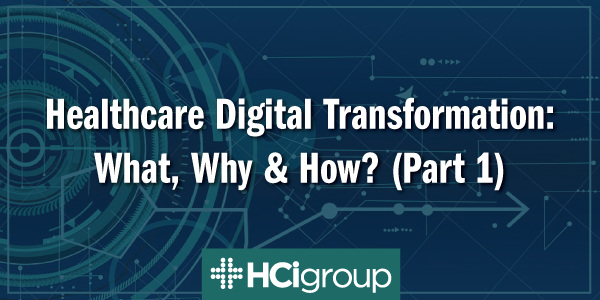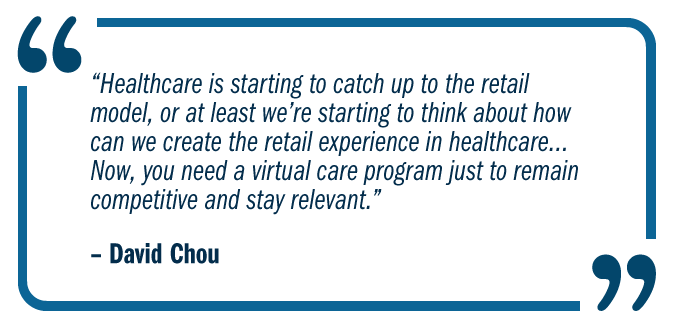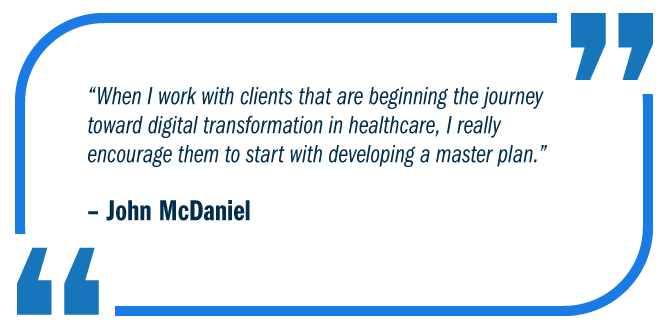Healthcare Digital Transformation: What, Why & How? (Part 1)


This is part 1 of our "Healthcare Digital Transformation: What, Why & How" blog series. Subscribe to our blog today to be notified when parts 2 & 3 are released!
Following our recent webinar, The Journey Toward Digital Transformation, we sat down with digital transformation executive, visionary leader and CIO of Children’s Mercy Hospital, David Chou, and HCI Executive Vice President of Technology & Innovation, John McDaniel to respond to questions that were submitted by audience members. The conversation hit on several topics and trends surrounding digital transformation in healthcare.
Digital transformation in healthcare means a lot of things to many different people, what does it mean to you?
David Chou
I think that digital transformation, it starts with process. You must change your processes operationally. It’s not about buying the latest, shiny tool, or technology. It’s really looking at changing your operational process, followed by: how can you automate with technology to make that process more efficient?
John McDaniel
I would pretty much agree with what David just said, but I would add that it’s really the advancement of how care is delivered to consumers utilizing the new technologies that he alluded to.
It’s a different kind of delivery model. It’s basically using information gathered from new digital devices to do a much better job of effectively keeping individuals healthy and well. And having them (patients) engaged in the process comes with challenges. I think the biggest challenge, and David alluded to it, is that the technology is bright, shiny, and often purchased without really having a plan to look at how are we going to engage the process with the technology. So, often you buy technology, and there’s really nothing to do with it, or it isn’t accepted, because you haven’t got to that phase yet.
To what extent, and how is healthcare catching up, or beginning to surpass other industries from a technology perspective?
David Chou
Healthcare is starting to catch up to the retail model, or at least we’re starting to think about how can we create the retail experience in healthcare. Just look at how prominent virtual care model is throughout the US, and throughout the world. Five years ago, having a virtual care and telematic program would be a competitive advantage. Now, you need a virtual care program just to remain competitive and stay relevant. We are thinking about how we can provide care at the point of location where the patient is, versus the other way around. This is similar to our experience in the retail model.
We’re also trying to move toward a more transparent model, where organizations are starting to show the cost of care, so that the consumer can start shopping. At the end of the day, there’s lots of options these days; customers are more educated than ever and the trend toward more consumerism is starting to catch up. We have not surpassed other industries from a digital transformation perspective, and we may not. But I’m okay with healthcare being a follower, while watching and monitoring other verticals who are taking the lead in terms of what that technology trend is moving toward.
John McDaniel
I agree 100% with what David just said. What I would add is that our industry requires some significant investment in technologies. When you look at the margins that we currently have in place, 2-3% if you’re doing well, it’s very difficult to compete or maintain a level of investment in technology. However, the more important point is: I see the whole movement for healthcare to move to digital technologies driven by the consumer. As CEOs and CFOs listen more intently to the consumer market, part of those dollars that haven’t been used for IT expenditures in the past will be applied toward digital health technologies. This will hold true, especially as we start to demonstrate the quality implications of care, and more importantly, the cost reductions they will have associated with that.
The other challenge that we have as an industry is that as we engage with these technologies, it is a delivery model change. We must focus on re-training several individuals in provider organizations on how to utilize this technology in a new process. I agree that we will probably never catch up to other industries, but what is more important is that we are watching and learning from other industries.
What kind of milestones are there for healthcare organizations to digitally transform?
David Chou
I will give a very basic example: large health systems struggle with providing easy access for patients. It starts with just having a good registration process, or a very easy registration process. Most of what needs to happen to digitally transform and create a better experience starts with your process of registration. How you are avoiding any duplicated efforts? How are you making the process easier, both for your employees and for the patient and the patient’s family? These are things that we really need to start thinking about and overcoming as far as challenges.
Many components of registration are very simple on the surface, but when we look at the details of them operationally, they can span across a lot of different business units in the health system. The larger you are, with more business units to span across, the tougher it is to create that synergy, and that cohesiveness that is need. So, these are milestones that need to happen as a foundation. Once you have this common experience and processes, you can start thinking about how to digitally transform.
How do you roll out a self-service model to a consumer or patient to schedule themselves? The patients don’t need to call in to speak with a caregiver because everyone has a computer (phone) in their pocket now. You create a platform for your patients to take advantage and perform some self-service process.
John McDaniel
When I work with clients that are beginning the journey toward digital transformation in healthcare, I really encourage them to start with developing a master plan. This helps them clearly identify what they’re trying to do, even though there are so many unknowns. The important part of a plan is getting all the constituents involved in the planning process, including the consumers, to start developing that roadmap.
The master plan looks at what processes would be impacted by these technologies and which individuals would be impacted by these technologies. As David alluded to, the operationalization of these roadmaps is going to be the real challenge. But, I think you start with the strategy and focus on changing the culture of an organization, which doesn’t happen overnight.
Healthcare is really challenged from the standpoint that, at the end of the day, and this is my opinion, most CEOs see their real customer as the physician. The physician often dictates what needs to happen. As the culture changes and we start to recognize that the real consumer is the patient, or the individual that needs health assistance, this is going to be a challenge.
There can be so many impacts on healthcare of digital technologies. As we start to engage with these new technologies, and look at how they impact both the organization and the consumer, I can illustrate that in a laboratory setting. We must start with a plan, look at changing the culture and create an innovation lab or innovation center. This will allow the ability to test, and in some cases, develop new technologies and processes.
Checkout these recent digitial transformation healthcare blog posts:
- Digital Transformation = Cultural Transformation
- 3 Roadblocks to Digital Transformation
- David Chou on Leading Digital Transformation
To learn more about Digital Transformation and how HCI can support your efforts, please contact us using the button below.

